Urinary Tract Infections and Bacterial Vaginosis
Urinary tract infections (UTIs) and bacterial vaginosis (BV) are two common bacterial infections that can occur during pregnancy. A UTI is an infection of the body’s urinary system (which can involve the bladder, kidneys, and/or the tracts that connect these systems). Bacterial vaginosis is an infection of the vagina due to an imbalance of naturally-occurring flora.
Both urinary tract infections and bacterial vaginosis (when left untreated) can cause serious permanent birth injuries and obstetrical complications (including premature birth, sepsis, meningitis, hypoxic-ischemic encephalopathy (HIE), and cerebral palsy).
It’s possible that symptoms of both UTI and BV will not manifest in the mother, so standard procedure dictates that physicians should screen pregnant women for infection throughout pregnancy. If they find signs of infection, they must treat them with appropriate antibiotics, which are determined using a susceptibility test. UTIs and bacterial vaginosis can be recurring, so doctors must use a repeat urine culture to make sure the infections have been completely treated.
UTIs and BV During Pregnancy
During pregnancy, changing hormones can leave expectant mothers predisposed to infection. Urinary tract infections (UTIs) and bacterial vaginosis (BV) are two of the most common complications an expectant mother may experience during pregnancy. Mismanaged, undiagnosed, or left untreated, both UTIs and BV can result in dangerous, permanent birth injuries, complications, and newborn health problems. Throughout this page, our Detroit, Michigan birth injury attorneys will discuss everything you need to know about urinary tract infections, bacterial vaginosis, medical malpractice, and birth injuries. Contact our team if you have any legal questions or case inquiries.

Urinary Tract Infections (UTIs)
What are urinary tract infections (UTIs)?
A urinary tract infection (UTI) is an infection in the body’s urinary system, which includes the kidneys, ureter (the tube that carries urine from the kidneys to the bladder), the bladder, and the urethra (the short tube that carries urine from the bladder to outside the body). UTIs can take the form of lower tract infections (bladder infections) or upper tract infections (kidney infections or pyelonephritis). UTIs are the most common complication of pregnancy. Pregnant women are at an increased risk for infections between weeks 6 and 24. Untreated UTIs can cause dangerous and permanent birth injuries and obstetrical complications including intrauterine infection, premature birth, brain damage, and neonatal infection.
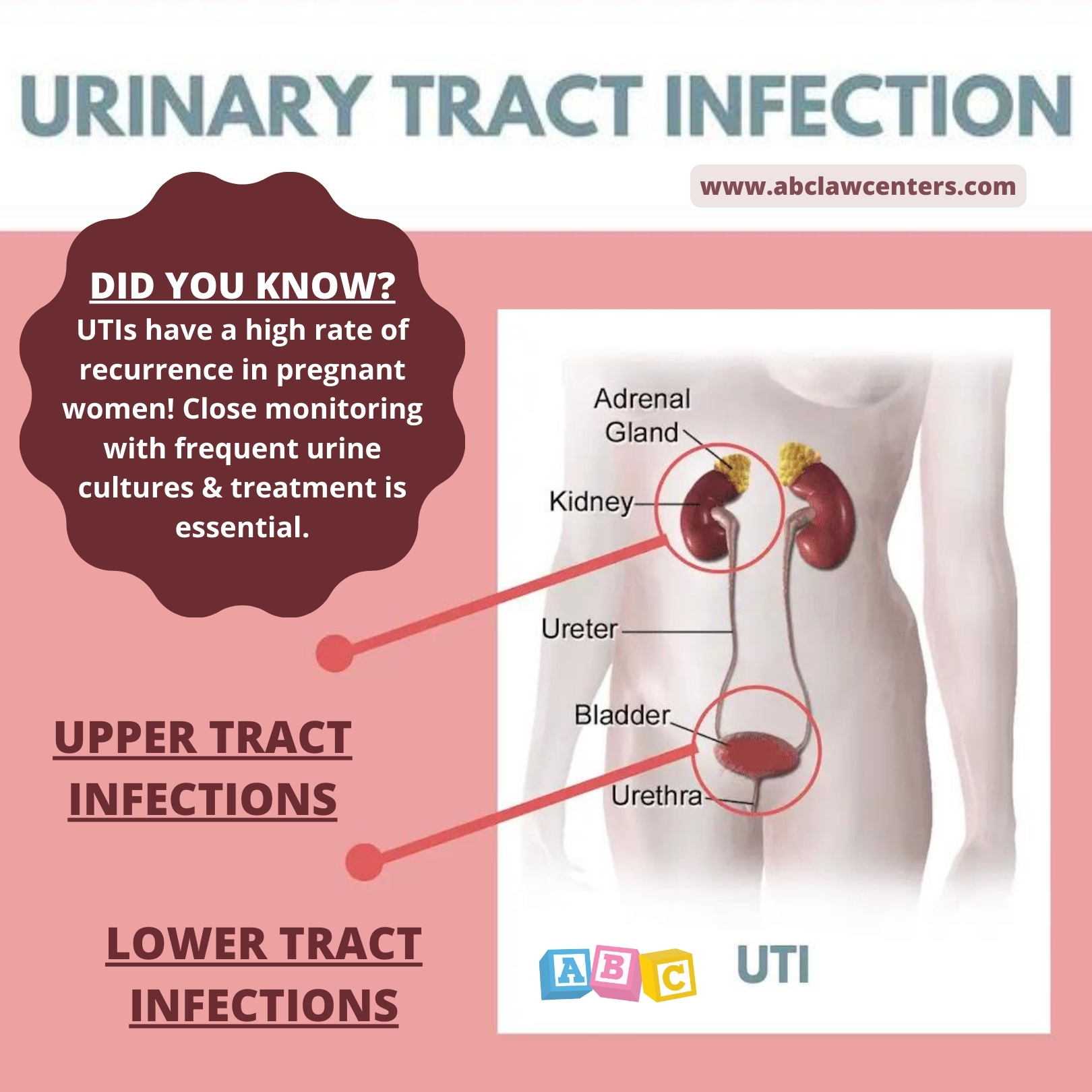
Signs and symptoms of urinary tract infections (UTIs)
Symptoms of a urinary tract infection may include the following:
- More frequent need to urinate
- Pain or burning during urination
- Pain during sexual intercourse
- A feeling of urgency during urination
- Urine that is cloudy and smells foul
- Blood or mucus in the urine
- Waking up from sleep to urinate
- Cramps or pain in lower abdomen
- Chills, fever, or sweats
- Leaking of urine (incontinence)
- Change in amount of urine
- Pain, pressure, or tenderness in the area of the bladder
- Back pain, chills, fever, nausea, and vomiting may occur if bacteria spreads to the kidneys
Causes of urinary tract infections (UTI)
UTIs are usually caused by bacterial infections. These most often enter the bladder through the urethra, but infection may occur through the blood or lymph. Bacteria can enter the urinary tract by way of sexual intercourse, catheters, stool, or partial blockage of a urinary passage.
- Changes in uterine size: Urinary tract infections are more common during pregnancy because of changes in the urinary tract. Because the uterus sits above the bladder, its growth during pregnancy can block drainage of urine from the bladder, thereby causing infection.
- E. coli: E. coli can be transmitted to the urethra from the bowel. Wiping from front to back every time you use the bathroom can help prevent the bacteria from entering the urethra.
- Group B Streptococcus (GBS): is a specific type of staph infection and is known to cause UTI infections. Your doctor will test you for GBS late in pregnancy and treat you with antibiotics if necessary.
- Sexual intercourse: Intercourse is fine during pregnancy, but can lead to UTI. It’s a good idea to use the restroom before and after intercourse.
Risk factors for urinary tract infections (UTI)
Risk factors for UTI include:
- Damage to the nerves that control the bladder from physical injury, Parkinson’s disease, multiple sclerosis, or other conditions
- Diabetes
- Obesity
- Sexual activity (in young women)
- Having had several children
- History of UTI
- Previous urinary surgery
- Sickle cell disease
Diagnosing urinary tract infections (UTI)
Urine cultures and urinalysis can detect urinary tract infections throughout a woman’s pregnancy. The American College of Obstetrics and Gynecology (ACOG) recommends that a urine culture is obtained at the first prenatal visit. A repeat urine culture should be obtained during the third trimester because the urine of treated patients may not remain sterile throughout the entire pregnancy. The recommendation of the U.S. Preventive Services Task Force is to obtain a urine culture between 12 and 16 weeks of gestation. Urine cultures are preferred to the office-based screening tests, such as a urinalysis and dipstick testing, which lack sufficient sensitivity and specificity.
Treatment for urinary tract infections (UTIs)
Antibiotics administered throughout a pregnancy can safely treat urinary tract infections. Antibiotic courses must be safe to both the mother and the baby, and the choice of antibiotic should address the most common infecting organism (for example, gram-negative gastrointestinal organisms). Historically, ampicillin has been the drug of choice, but in recent years, E. coli has become increasingly resistant to ampicillin and other antibiotics, such as sulfamethoxazole/trimethoprim (SXT) and ceftriaxone. Thus, it is imperative that antibiotic susceptibility testing is performed to determine which antibiotics will work to treat a specific woman’s infection. Another urine culture should be performed to make sure that the UTI has been successfully cured. Urinary tract infections have a high rate of recurrence in pregnant women, so close monitoring with frequent urine cultures and treatment is essential. It also is imperative for the doctor to prescribe a more sensitive antibiotic if a woman’s infection is not cured by the treatment or the infecting bacteria is resistant to the antibiotic(s) given. In complicated cases, a longer course or intravenous antibiotics may be needed, and if symptoms haven’t improved, further diagnostic testing is necessary.
Some pregnant women with urinary tract infections may not present symptoms of infection. Because untreated UTIs can cause dangerous, permanent birth injuries, it is critical that physicians detect and treat UTIs in asymptomatic women. By screening for and aggressively treating pregnant women with bacteriuria (bacteria in the urine), it is possible to significantly reduce the risk of kidney infection during pregnancy. Additionally, research shows that treatment of pregnant women with asymptomatic bacteriuria has been shown to decrease the incidence of preterm birth and low birth weight infants.
Treating kidney infection
A kidney infection (pyelonephritis) is a serious illness that can progress to maternal sepsis, preterm labor, and premature delivery. Early, aggressive treatment is important in preventing these complications. Hospitalization is indicated for women who are exhibiting signs of sepsis, who are vomiting and unable to stay hydrated, or who are having contractions.

Complications of urinary tract infections (UTI)
Mismanaged urinary tract infections can cause several dangerous side effects and complications during pregnancy. The biggest concern is that a UTI can become a kidney infection. Kidney infections are associated with low birth weight and early labor. The following birth injuries, obstetrical complications, and neonatal health problems can result from a mismanaged UTI:
- Intrauterine growth restriction (IUGR)
- Low birth weight
- Preterm birth
- Sepsis
- Preeclampsia and other hypertensive (high blood pressure) disorders of pregnancy
- Amnionitis
- Anemia
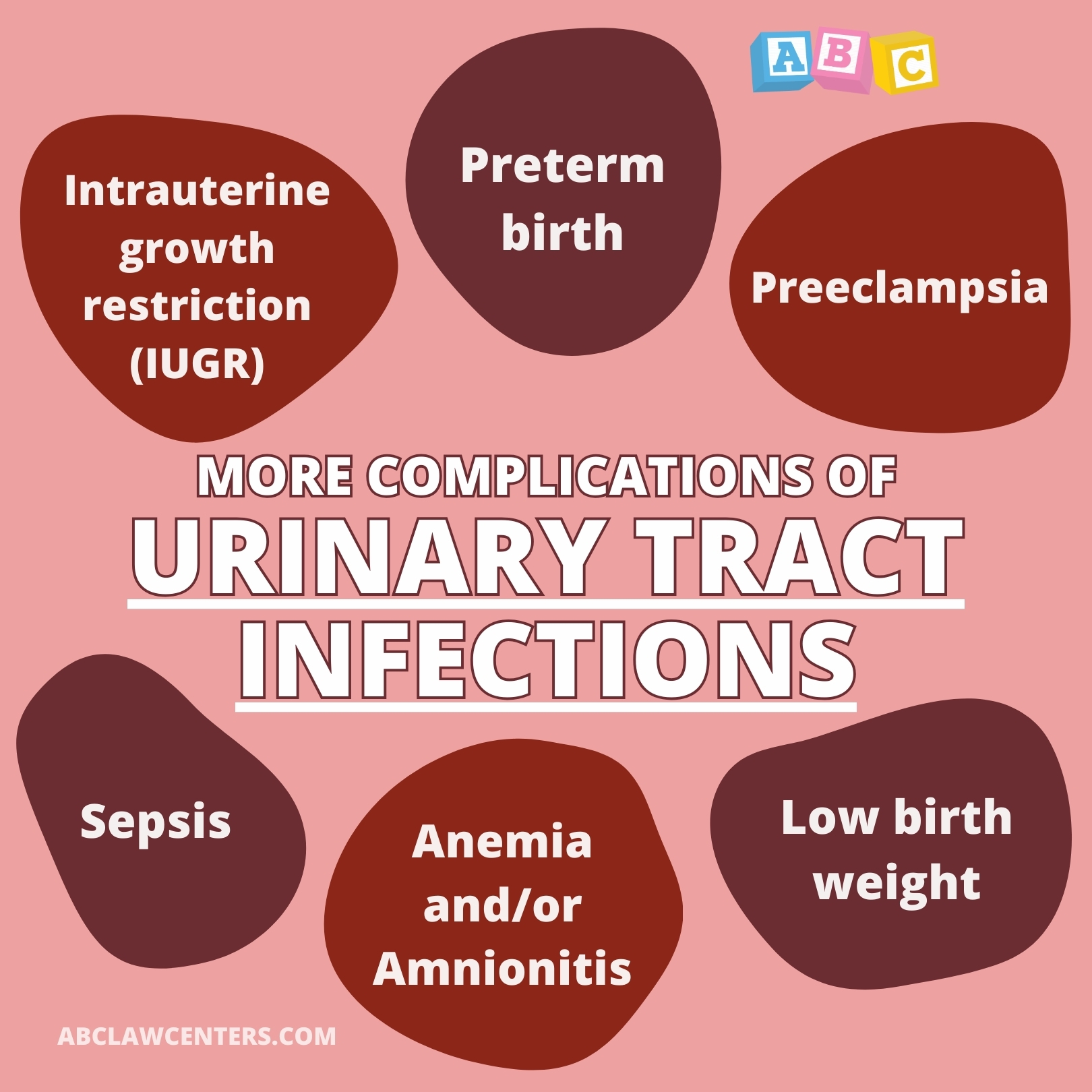
Preventing UTI during pregnancy
Some actions that may reduce your risk of getting a UTI during pregnancy include:
- Urinating when you need to and emptying the bladder completely when doing so
- Drinking 6-8 glasses of water each day
- Drinking unsweetened cranberry juice
- Limiting refined foods, sugars, caffeines, fruit juices, and alcohol
- Taking Vitamin C, Zinc, and Beta-carotene to fight infection
- Urinating before and after intercourse
- Avoiding tight-fitting pants
- Changing underwear and pantyhose daily
- Not soaking in a bathtub more than twice daily or for longer than 30 minutes at a time
- Wearing all-cotton or cotton-crotch underwear
- Avoiding the use of strong soaps, feminine hygiene sprays, powders, or douches
Bacterial Vaginosis (BV)
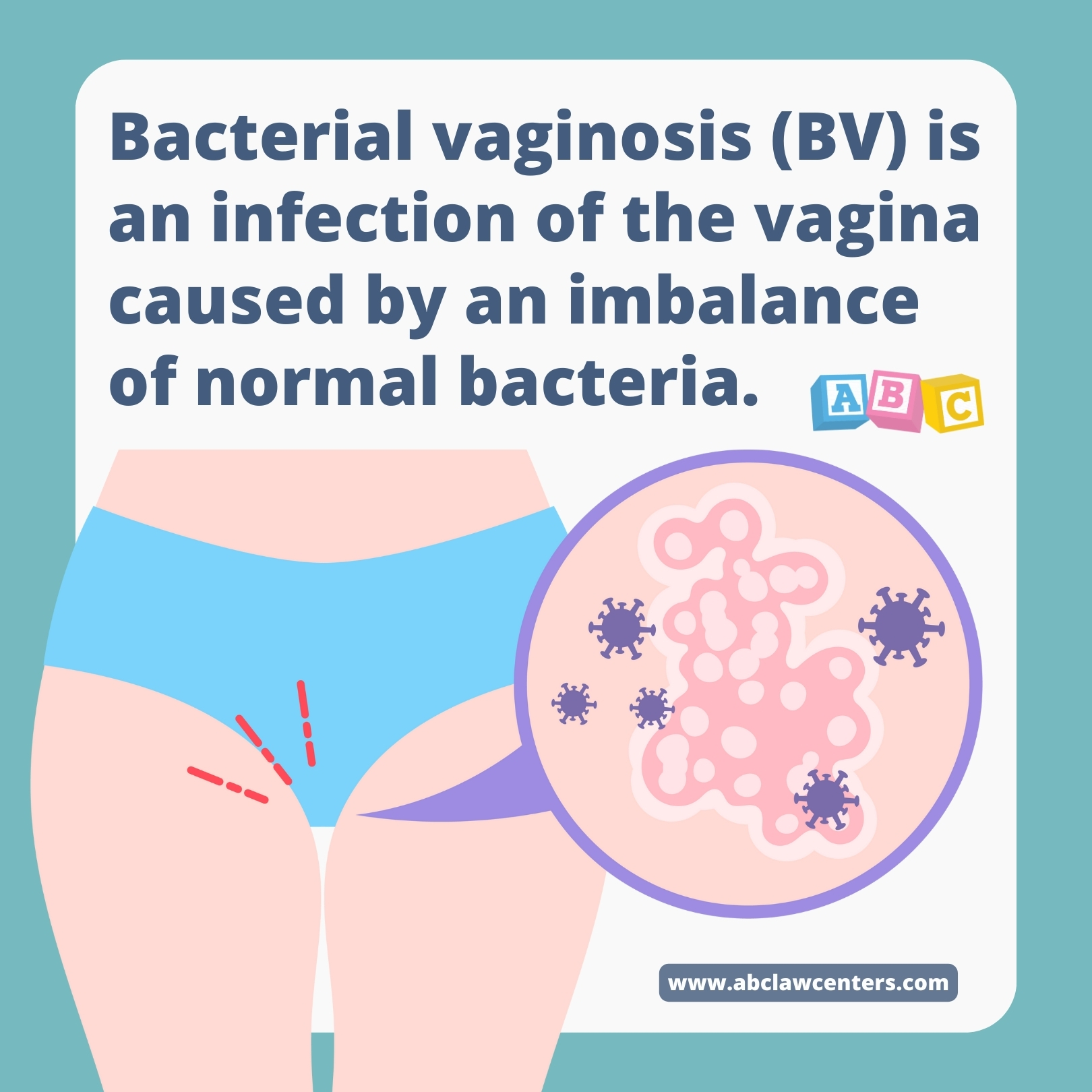
What is bacterial vaginosis (BV)?
Bacterial vaginosis (BV) is an infection of the vagina caused by an imbalance of normal bacteria. Bacterial vaginosis affects approximately 10-30% of pregnant women. If bacterial vaginosis is misdiagnosed or mismanaged during pregnancy, the baby can become infected and develop sepsis, meningitis, brain damage, and conditions such as hypoxic-ischemic encephalopathy (HIE) and cerebral palsy.
Signs and symptoms of bacterial vaginosis (BV)
50% of women infected with bacterial vaginosis do not experience symptoms. The chief symptom of bacterial vaginosis is abnormal vaginal discharge. This discharge is gray or whitish and has a foul fishy odor.
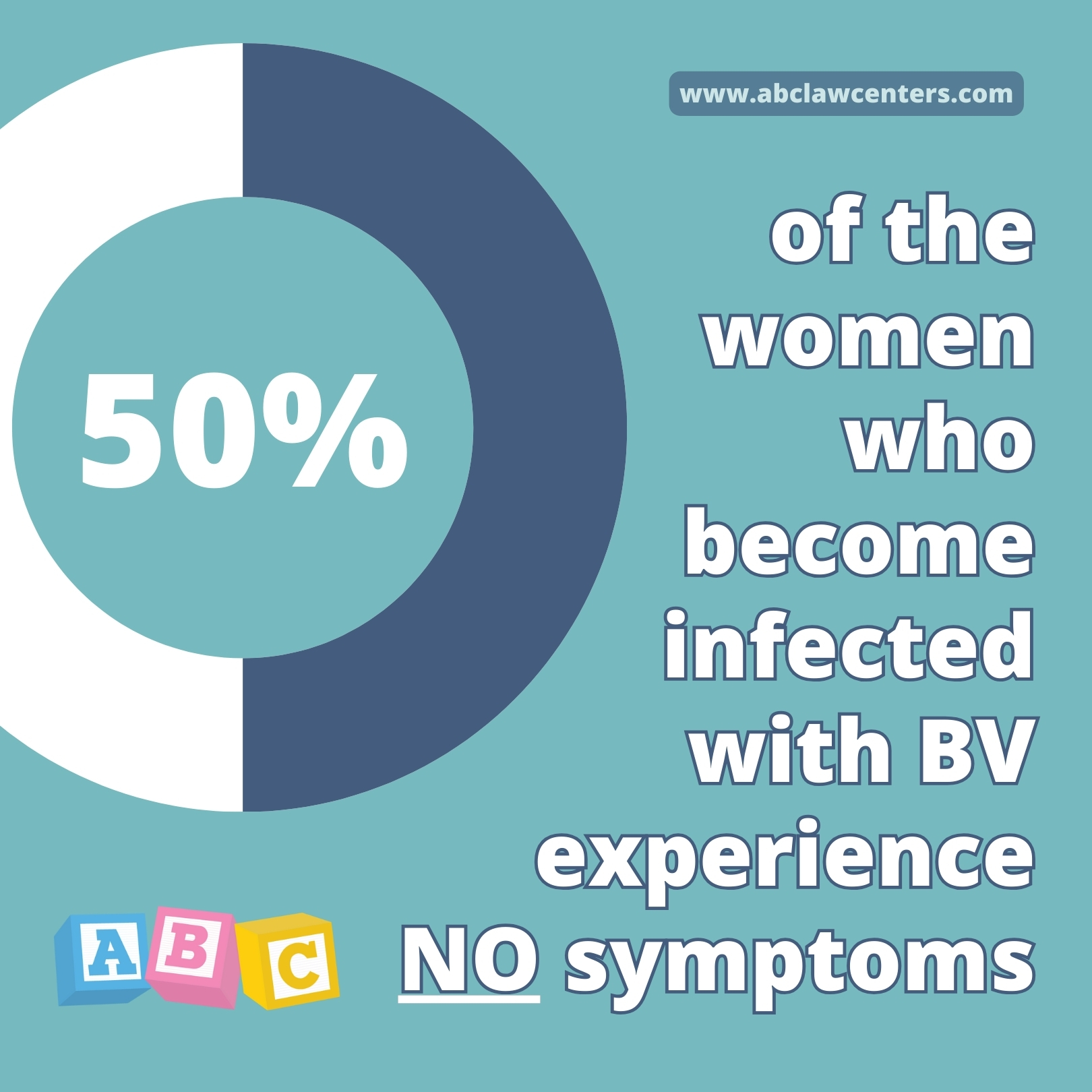
Causes of bacterial vaginosis (BV)
Normally, the vagina contains several microorganisms that prevent other vaginal microorganisms from multiplying to a level where they cause imbalance and health problems. One of these microorganisms is Lactobacilli. The microorganisms involved in bacterial vaginosis are very diverse, and a change in the normal bacterial flora, including the reduction of Lactobacilli, allows more resistant bacteria to start to predominate and multiply. The cause of bacterial vaginosis has not been clearly identified, but certain risk factors for bacterial vaginosis do exist.
Risk factors for bacterial vaginosis (BV)
Risk factors for bacterial vaginosis include:
- Douching
- New or multiple sex partners
- Early age of sexual intercourse
- Use of intrauterine contraceptive devices
- History of BV
Diagnosing bacterial vaginosis (BV)
The CDC recommends that all pregnant women who have symptoms of bacterial vaginosis or who have had previous preterm labor be screened and treated. Bacterial vaginosis is diagnosed through a pelvic exam. When diagnosing bacterial vaginosis, medical professionals look for the following:
- Homogenous, milky, or creamy discharge
- Presence of true clue cells on microscopic exam
- pH of secretions above 4.5
- Fishy or amine odor with or without addition of 10 percent KOH
The CDC has noted that some specialists recommend screening and treatment during the first prenatal visit of women who had a previous premature infant. Additionally, these guidelines recommend follow-up examinations one month after initial screening and treatment.
Treatment for bacterial vaginosis (BV)
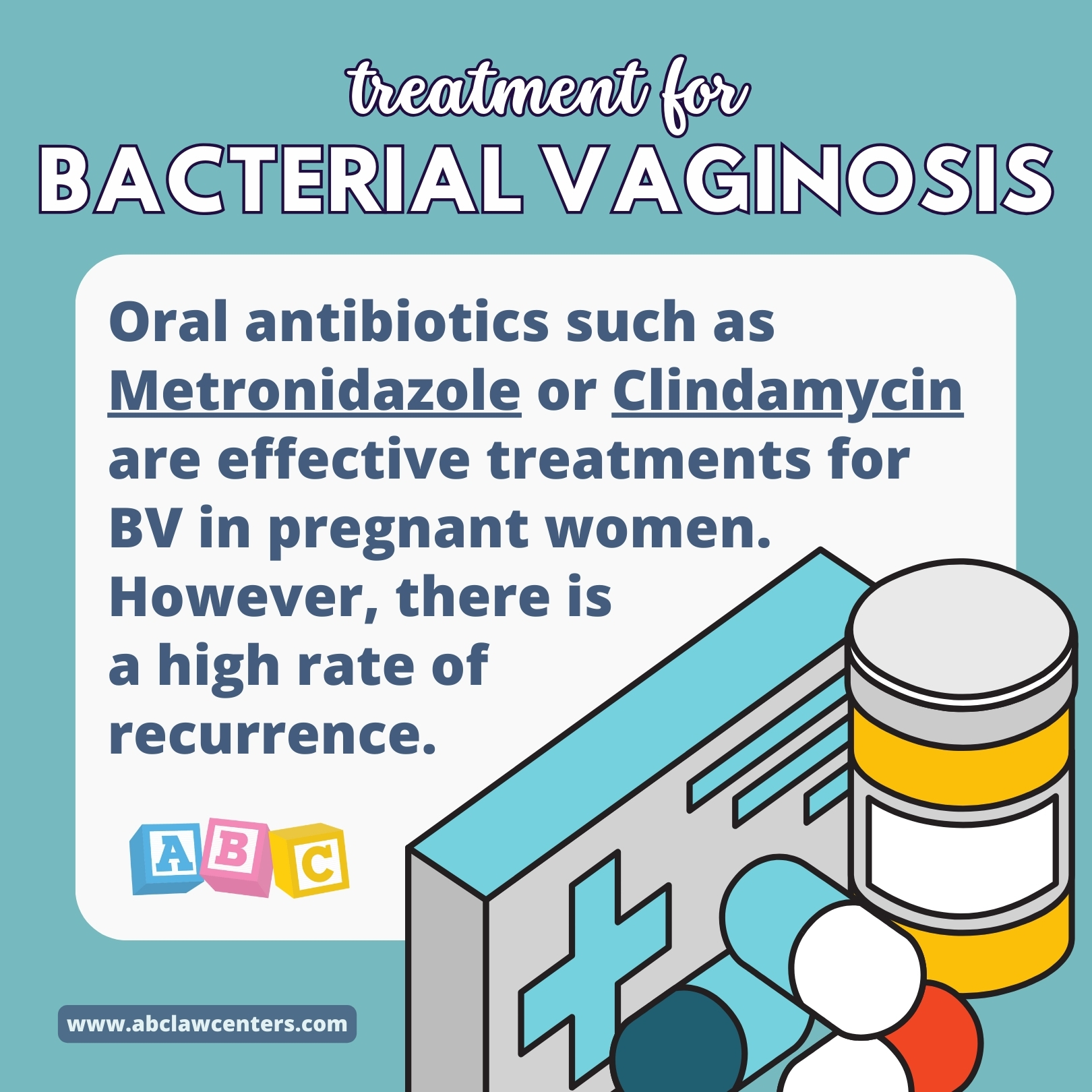
Oral antibiotics such as Metronidazole or Clindamycin are effective treatments for BV in pregnant women. However, there is a high rate of recurrence in bacterial vaginosis.
Complications of bacterial vaginosis (BV)
Mismanaged cases of bacterial vaginosis can cause dangerous side effects and complications during pregnancy. The biggest concern for women with bacterial vaginosis is preterm birth, which can cause many complications for the baby. The following birth injuries, obstetrical complications, and neonatal health problems can result from a mismanaged case of BV:
- Pelvic inflammatory disease (PID)
- Premature rupture of the membranes (PROM)
- Preterm birth (which can lead to brain damage and cerebral palsy)
- Sepsis
- Low birth weight
- Perinatal death
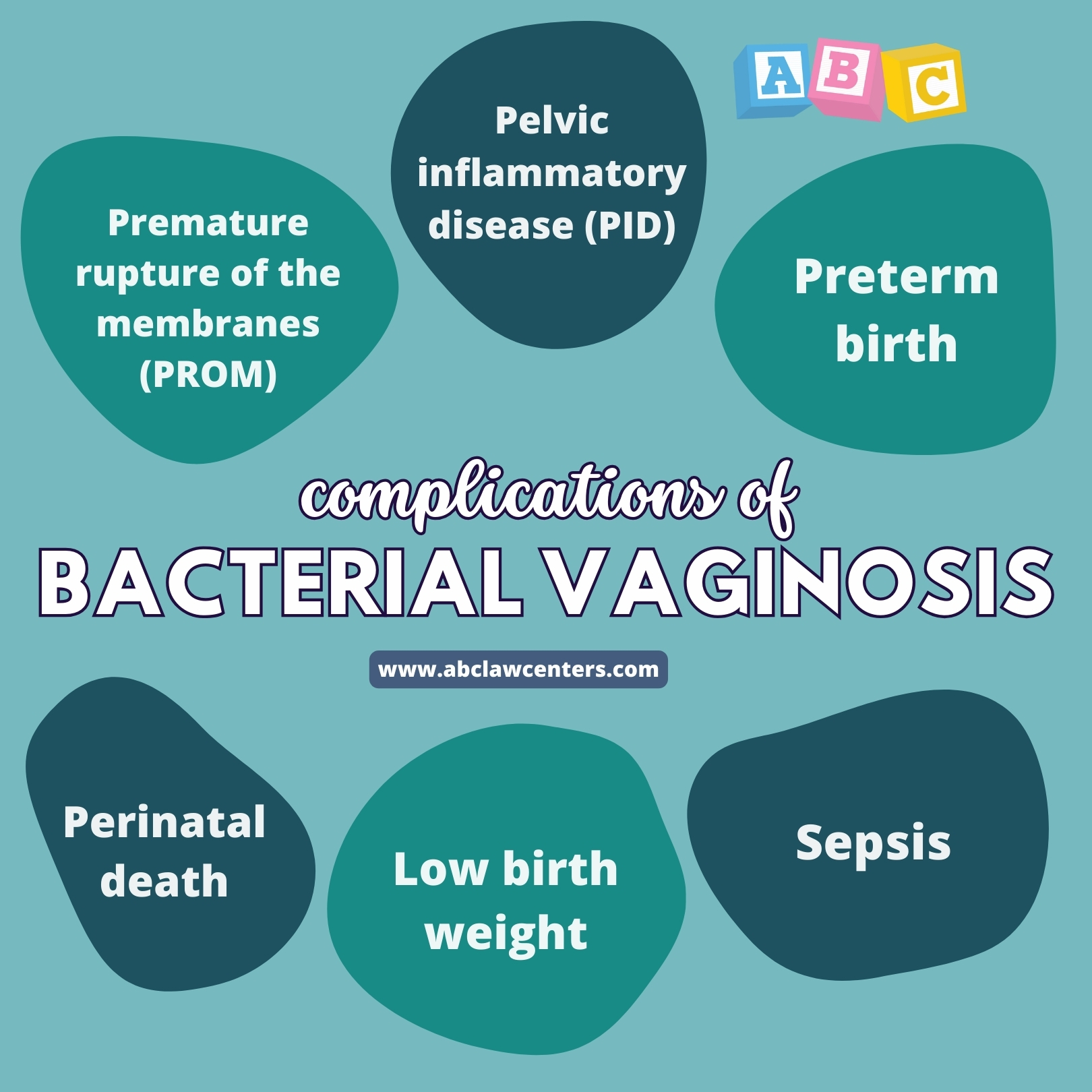
Untreated urinary tract infections (UTI) and bacterial vaginosis (BV) during pregnancy can cause neonatal brain damage
Bacterial vaginosis and urinary tract infections must be promptly and properly treated in pregnant women. Both infections are associated with increased risk of premature rupture of the membranes (PROM), preterm birth (which can lead to brain damage and cerebral palsy), low birth weight, sepsis, meningitis, and perinatal death. Because both infections often have no symptoms, it is standard practice for physicians to screen all pregnant women for the infection, particularly women with a history of preterm birth. A few studies show a connection between BV and second-trimester miscarriage, and it is standard practice to treat all pregnant women who have BV symptoms.
Medical malpractice, urinary tract infections (UTI), and bacterial vaginosis (BV)
Grounds for a medical malpractice case
Due to the potentially devastating complications associated with UTIs and BV, it’s crucial that the infections be accurately and promptly treated in all pregnant women. When a pregnant woman is not properly tested for UTIs or BV, and when standards for treating the conditions are not followed, it is medical negligence. If this negligence leads to injury in the baby or mother, it is medical malpractice.
The following situations may constitute medical negligence:
- Failure to screen a pregnant woman for urinary tract infections
- Failure to perform a bacterial vaginosis screening on a woman who has symptoms of or risk factors for BV
- Failure to perform antibiotic susceptibility testing for UTIs
- Failure to perform a test for a cure after treating urinary tract infections and bacterial vaginosis
- Failure to use appropriate antibiotics and/or failure to switch to a more sensitive antibiotic when necessary
- Utilization of antibiotics that are harmful to the mother or fetus


Legal help for mismanaged urinary tract infections (UTIs) and bacterial vaginosis (BV)
To determine if you are eligible for compensation from a medical malpractice case, contact our Detroit, Michigan birth injury attorneys. Since our firm’s inception in 1997, our legal team has helped families like yours receive compensation for birth injuries from mismanaged UTIs, bacterial vaginosis, and other complications.
Our attorneys handle cases in many parts of the United States. Additionally, our team handles cases involving military hospitals and federally funded clinics. Please reach out today for a free case review. In fact, you would pay nothing throughout the entire legal process unless we win.
Featured Videos
Posterior Position
Hypoxic-Ischemic Encephalopathy (HIE)

Featured Testimonial
What Our
Clients Say…
After the traumatic birth of my son, I was left confused, afraid, and seeking answers. We needed someone we could trust and depend on. ABC Law Centers: Birth Injury Lawyers was just that.
- Michael
Helpful resources
- Urinary tract infection (UTI). (2019, January 30). Retrieved February 11, 2019, from https://www.mayoclinic.org/diseases-conditions/urinary-tract-infection/symptoms-causes/syc-20353447
- Bacterial Vaginosis During Pregnancy: Symptoms & Treatment. (2017, February 03). Retrieved February 11, 2019, from http://americanpregnancy.org/pregnancy-complications/bacterial-vaginosis-during-pregnancy/
- Gilstrap, 3. R., & Ramin, S. M. (2001, September). Urinary tract infections during pregnancy. Retrieved February 11, 2019, from https://www.ncbi.nlm.nih.gov/pubmed/11512502
- Urinary Tract Infection During Pregnancy: Symptoms & Prevention. (2017, March 10). Retrieved February 11, 2019, from http://americanpregnancy.org/pregnancy-complications/urinary-tract-infections-during-pregnancy/
- Final Recommendation Statement. (n.d.). Retrieved February 11, 2019, from https://www.uspreventiveservicestaskforce.org/Page/Document/RecommendationStatementFinal/asymptomatic-bacteriuria-in-adults-screening
- What to Expect, E. (2018, March 06). UTIs During Pregnancy: Symptoms, Treatment & Prevention of Urinary Tract Infections. Retrieved February 11, 2019, from https://www.whattoexpect.com/pregnancy/uti/
- Women’s Health Care Physicians. (n.d.). Retrieved February 11, 2019, from https://www.acog.org/womens-health/faqs/urinary-tract-infections
- Delzell, J. E., & LeFevre, M. (2000, February 01). Urinary Tract Infections During Pregnancy. Retrieved February 14, 2019, from https://www.aafp.org/afp/2000/0201/p713.html
- Hooton, T. M., & Gupta, K. (n.d.). Retrieved February 14, 2019, from https://www.uptodate.com/contents/urinary-tract-infections-and-asymptomatic-bacteriuria-in-pregnancy
- Bacterial Vaginosis During Pregnancy: Symptoms & Treatment. (2017, February 03). Retrieved February 11, 2019, from http://americanpregnancy.org/pregnancy-complications/bacterial-vaginosis-during-pregnancy/
Disclaimer: We cannot provide treatments or medical advice. If you might be having a medical emergency, please call 911 (or your country’s emergency number) and seek immediate medical attention.


